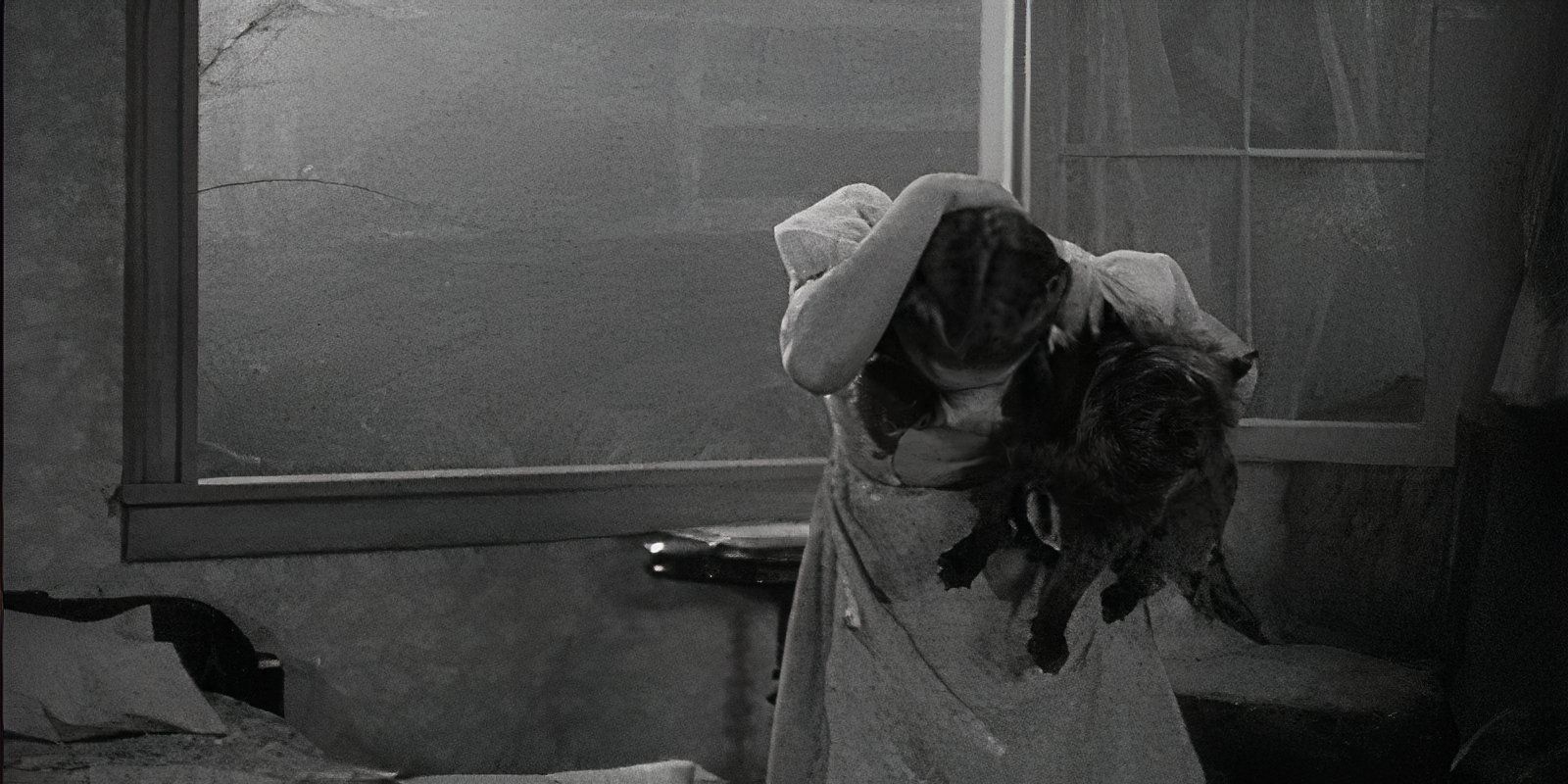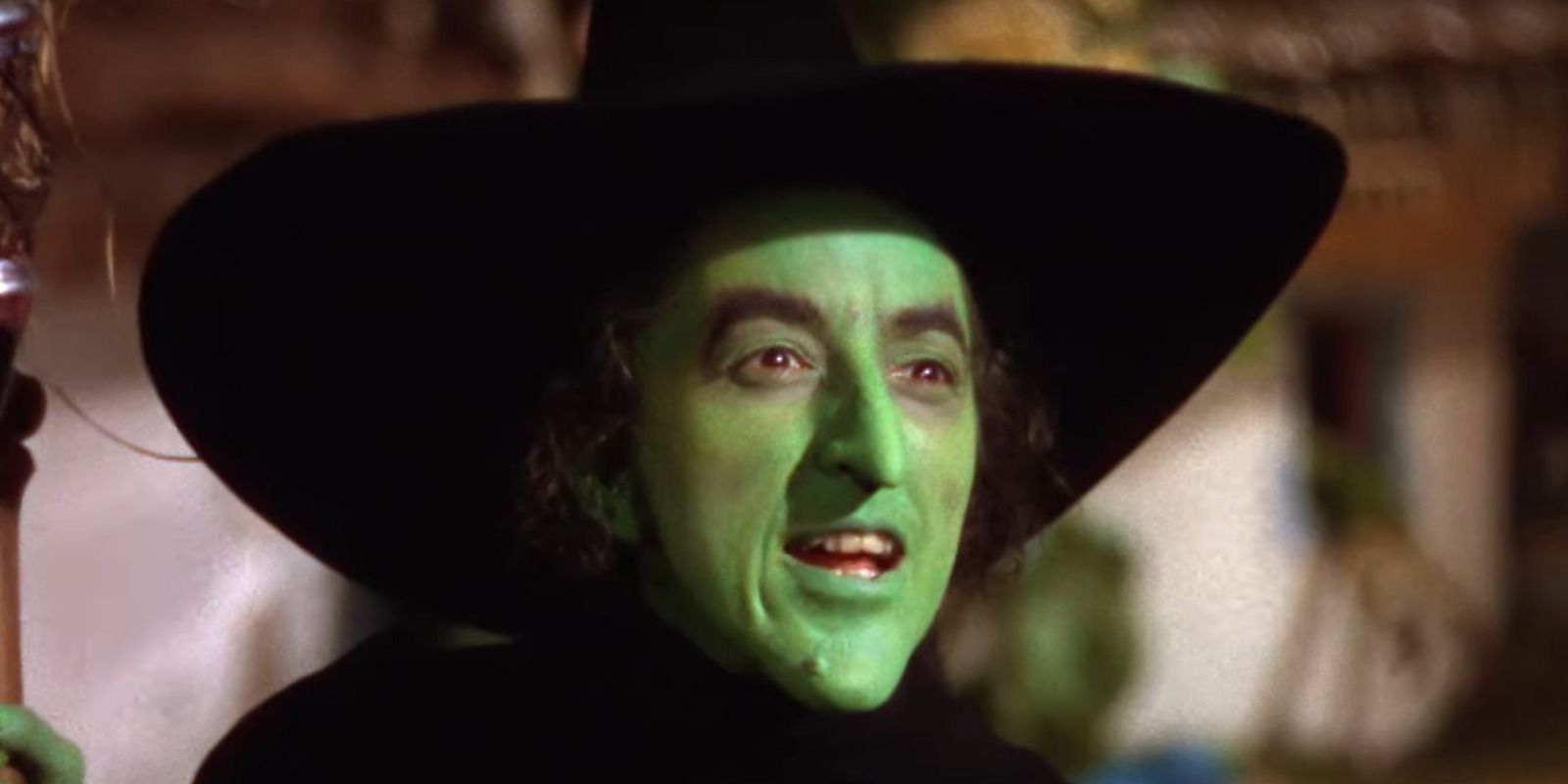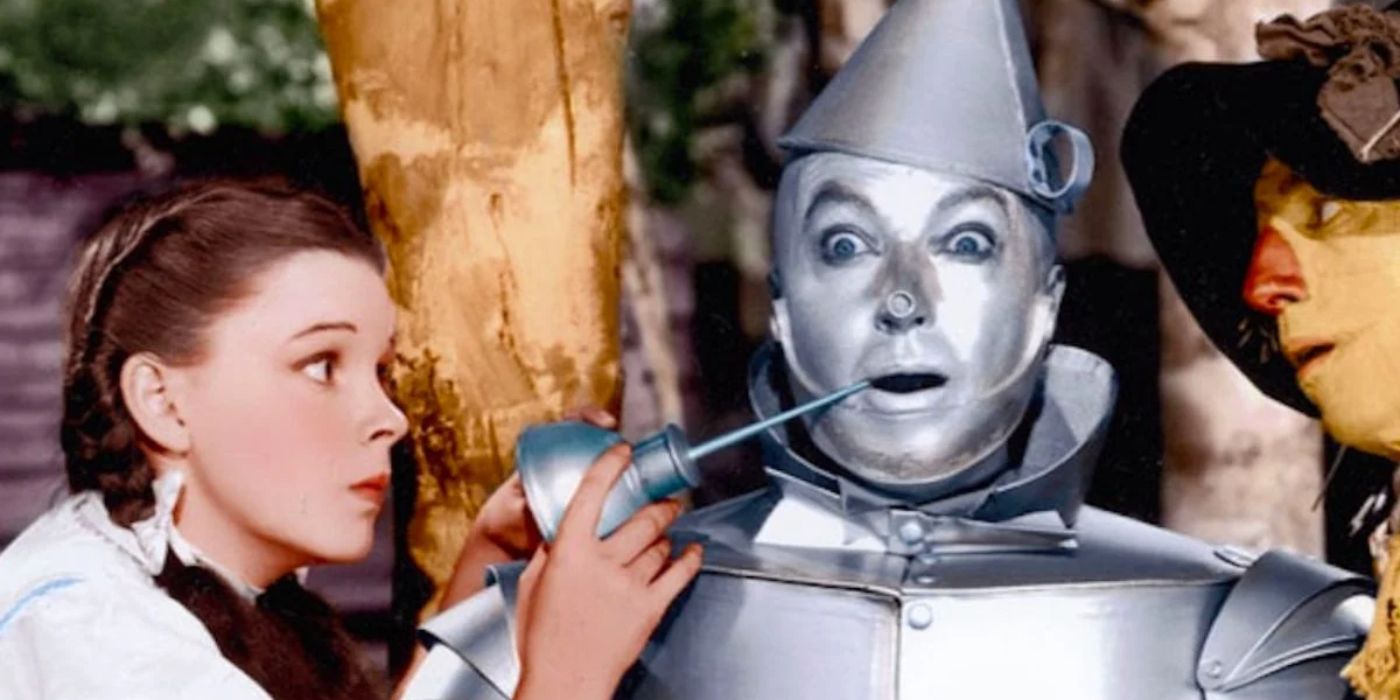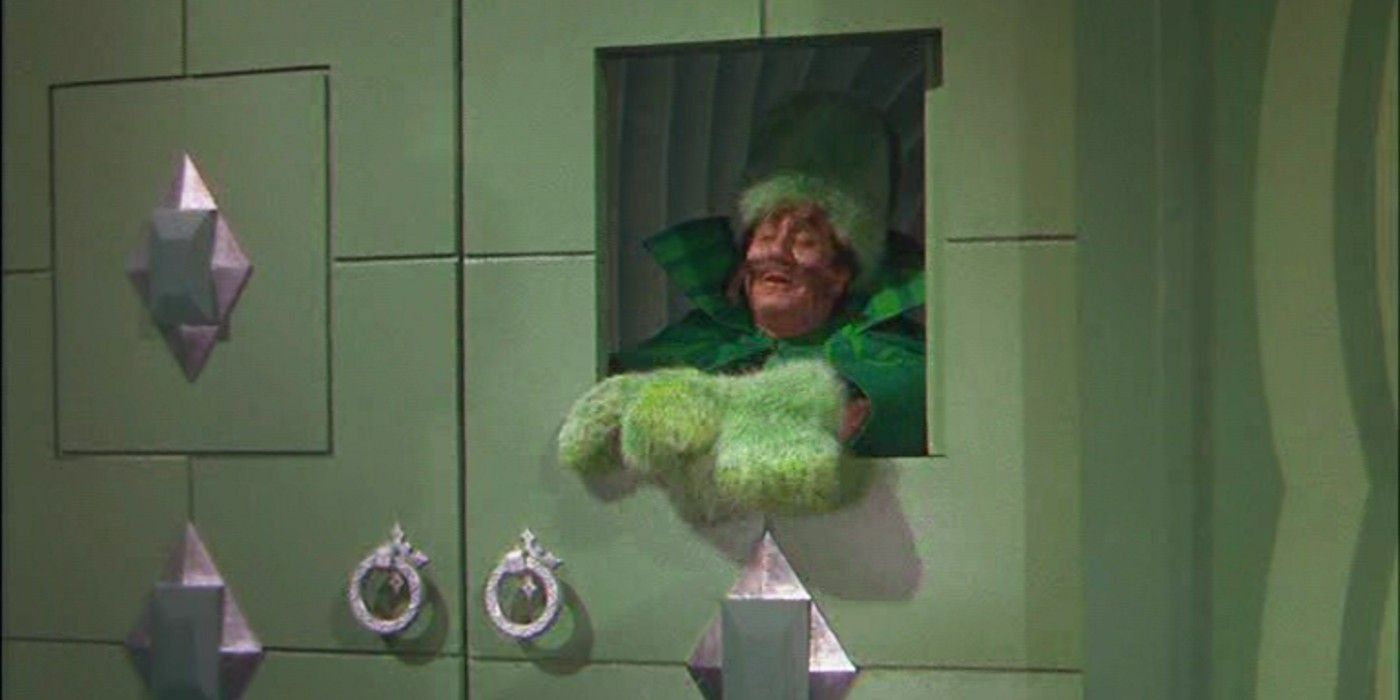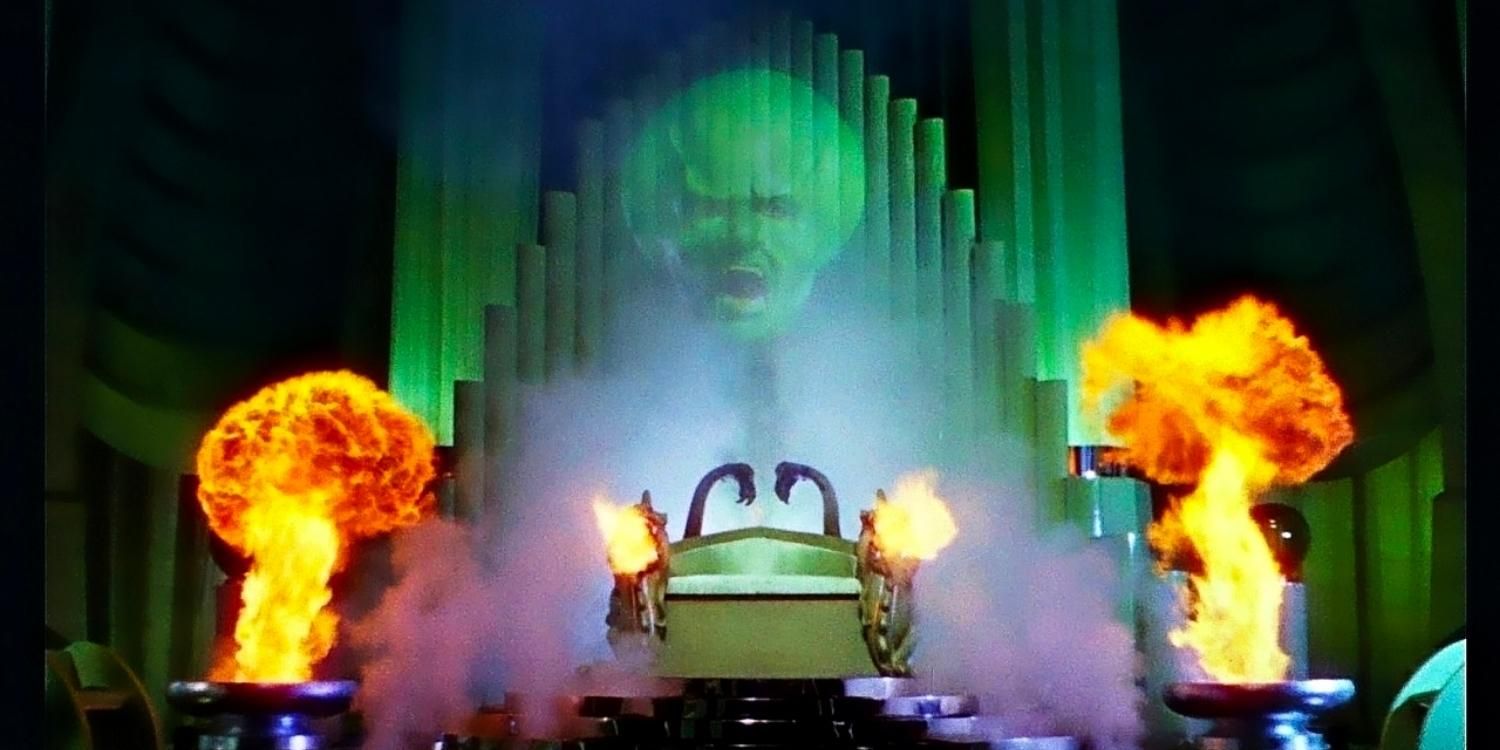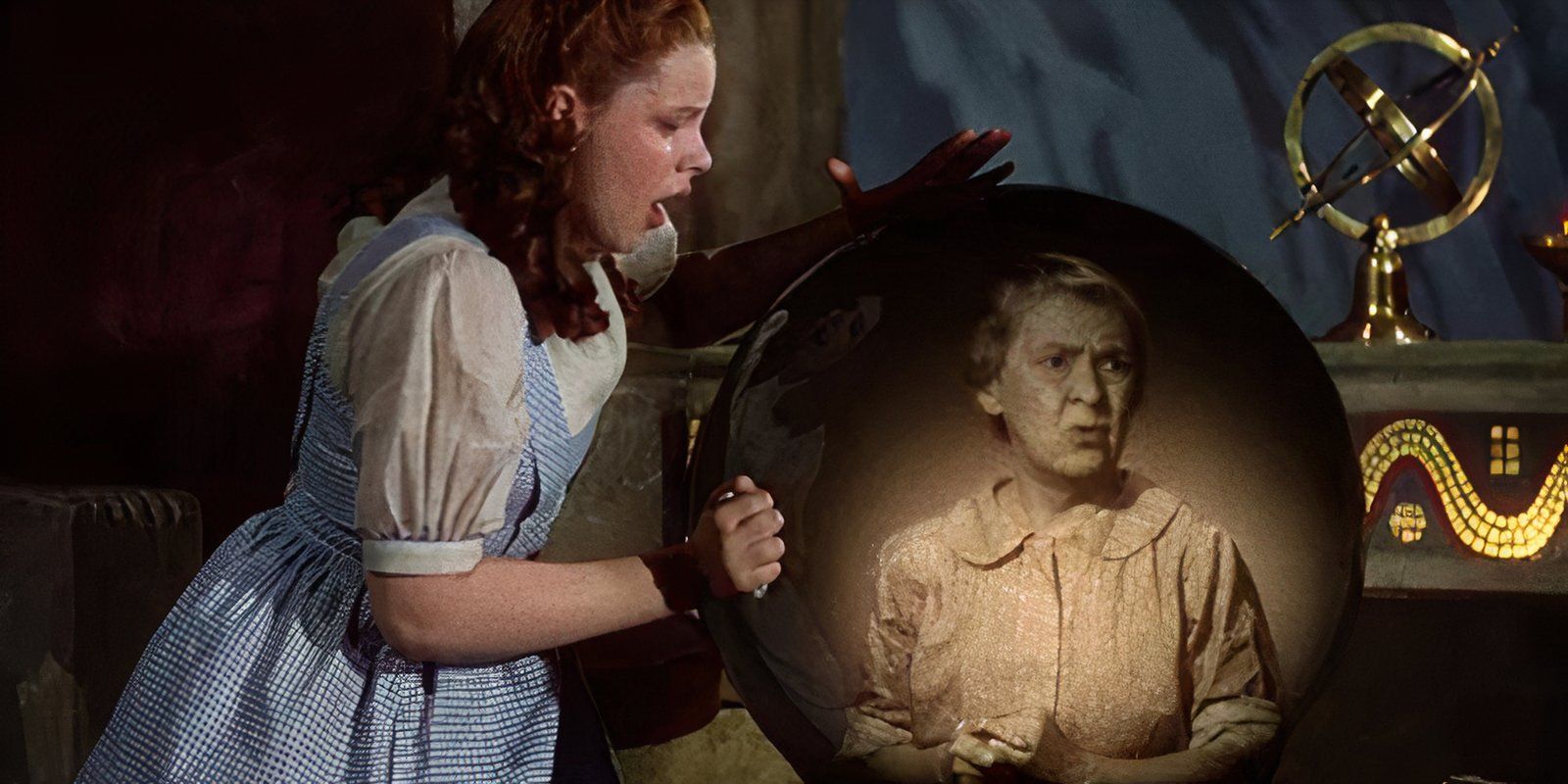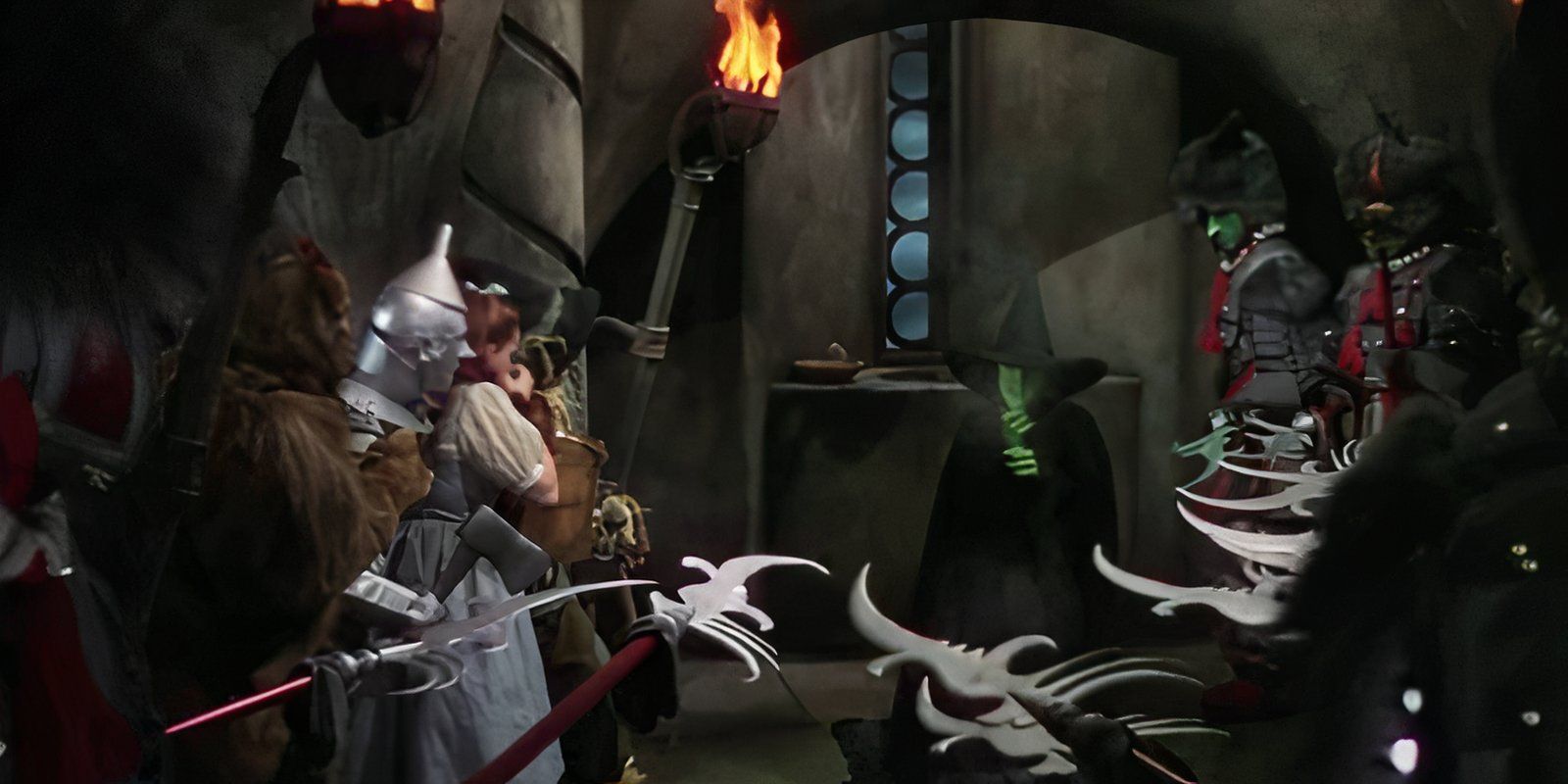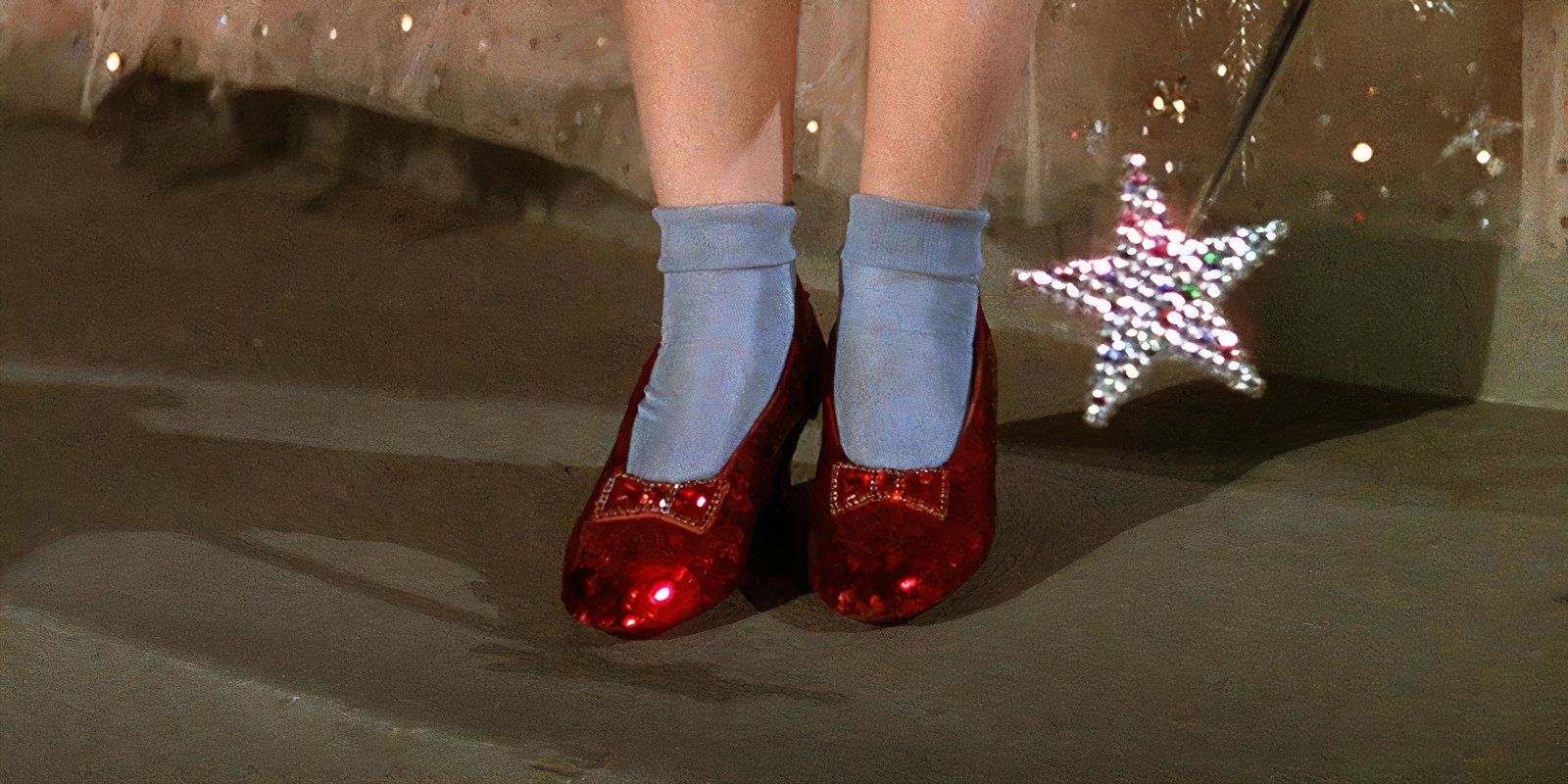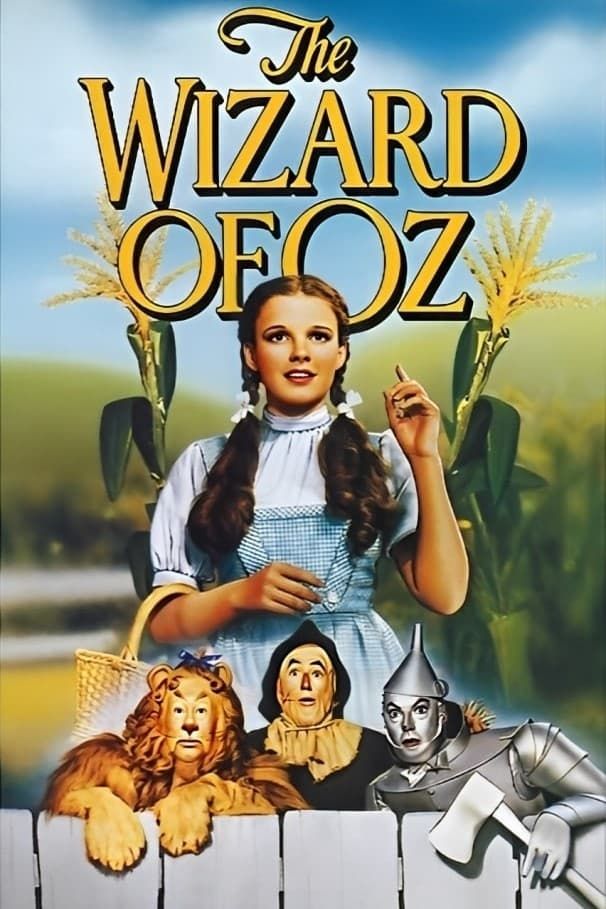Summary
- The Wizard of Oz’s 1939 adaptation remains the definitive version amidst various revamps and retellings of L. Frank Baum’s story.
- The film’s iconic sets, performances, songs, and costumes, including Dorothy’s ruby slippers, have helped it stand the test of time.
- Logical inconsistencies, such as Auntie Em’s dismissive behavior and the convenient knocking out of Dorothy, are noticeable upon rewatching.
The beloved classic The Wizard of Oz premiered 85 years ago, but time hasn’t necessarily been a friend to some aspects of the iconic movie. The Wizard of Oz’s cast was filled with stars at the time and the movie was a great hit when it premiered. The initial story written in 1900 by L. Frank Baum has received many revamps and retellings since its creation, yet it is the 1939 adaptation that remains the definitive version.
The Wizard of Oz is a highly quotable dream in both black and white and technicolor, with much of its imagery imprinted onto the public consciousness. The film is notable for its iconic sets, performances, songs, and costumes, including Dorothy’s famous ruby slippers – details that have helped it stand the test of time. However, though the film and Judy Garland’s performance are still highly revered after 85 years, the film has a few logical inconsistencies.
10 Auntie Em And Uncle Henry Dismiss Dorothy’s Claims
Despite Mistreatment And Emotional Turmoil, The Guardians Don’t Help Dorothy
At the beginning of the film, Auntie Em and Uncle Henry brush off Dorothy’s reports of Mrs. Gulch’s treatment of Toto. Mrs. Gulch’s retaliations, which include hitting Toto with a rake for terrorizing her cat, are very serious. Despite this severity, Auntie Em and Uncle Henry don’t seem to care and scold Dorothy for interrupting their work. Not only do they dismiss the treatment of Toto, but they ignore Dorothy’s apparent emotional distress.
Even in the following scene, when Mrs. Gulch says she plans to have Toto “destroyed,” the two don’t seem worried. Eventually, they scold Mrs. Gulch, though only when Dorothy leaves the room. The negligent scenes with Dorothy and her family are included to show how out-of-place Dorothy feels, leading her to sing “Somewhere Over The Rainbow.” Despite this being the film’s most iconic song, the neglect of Dorothy and Toto’s well-being is hard to rewatch.
9 The Farm Hand Introductions Are Too Blunt
Their Lines Need To Set Up Their Transformations Later
Since the real farm hands are only in a few minutes of the movie, their lines have to be straightforward and heavy-handed. By saying things like “have a little courage” and “straw for brains,” they hint directly at their Oz counterparts. These lines are incredibly specific and stylized, though they can go unnoticed when first watching.
Upon rewatching, when knowing that these will be the actors Dorothy sees in Oz, the set-up becomes too obvious. These characters have to be memorable and stand out within a few lines to be recognizable later in the movie, especially if the double-casting remains unknown. Their introduction also demonstrates a friendly and nearly familial connection with Dorothy, explaining why they would appear in her dream.
8 The Window Doesn’t Hit Dorothy With Enough Force To Knock Her Out
She Is Knocked Out Despite Barely Being Hit
The film’s inciting incident is when Dorothy is knocked out by a falling window in a tornado, leading to her dreams of Oz. When looking for her family, the window in her room hits her in the back of the head and leaves her unconscious on the bed. It seems the window is more dangerous than the storm since no other debris comes into the room, which is lucky for Dorothy since she is vulnerable on the bed.
Since this film is not a horror, the production chooses not to focus on the injury. However, it’s notable that Dorothy doesn’t seem to be that injured, at least not to the extent that she would be unconscious for so long. It is more convenient than realistic that she is knocked out so easily, leading to the chromatic plot of the movie.
7 The Wicked Witch Of The West Just Wants Justice For Her Sister
Her Sister Was Crushed Under Dorothy’s House
When the Wicked Witch of the West appears, Glinda smugly informs her that Dorothy’s house crushed her sister. Though it’s not the most mature reaction, the Wicked Witch vows to punish Dorothy for killing her sister. While it is telling of the Wicked Witch’s personality, she is understandably upset with Dorothy, especially after she also claims the ruby slippers.
The Wicked Witch of the West has been retold and adapted into the
musical
Wicked
, which is premiering as a feature film in November 2024.
Glinda also does not make the situation better. She sadistically taunts the Wicked Witch, reminding her of the ruby slippers and talking about her as if she wasn’t there. Despite the Witch’s requests, Glinda even encourages Dorothy not to give up the slippers. While it’s clear the Wicked Witch is evil, there isn’t any real reason for Dorothy to dislike her or for the audience to root against her, especially since she is sympathetic and grieving for her sister.
6 Dorothy And Scarecrow Wouldn’t Be Able To Understand The Tin Man
They Know How To Oil The Tin Man
When Dorothy and Scarecrow meet the Tin Man, his mouth is rusted shut. They approach him and attempt to help him speak, though they still need to figure out what is wrong. He tries to communicate that he needs the oil can. Since automated Tin Men are not typical, and this is likely Dorothy’s first encounter with one, it’s incredible that Dorothy could figure out what he needed and didn’t panic.
If they dismissed (the Tin Man) and continued on, the movie would be missing a significant character, thus the convenience of the oiling.
His mouth is so rusted shut that he is unintelligible, yet Dorothy and Scarecrow are able to tell that he is asking for the oil can. Even on rewatch, it is tough to tell what he is saying, and there is no way the two would be able to decipher him. However, if they dismissed him and continued on, the movie would be missing a significant character, thus the convenience of the oiling.
5 The Oz Doorman Would Have Been In Trouble
He Lets The Group In Against Orders
When they first arrive at the Wizard’s palace, the Oz doorman turns the group away. He tells them that the Wizard won’t see them, which is likely the typical protocol for appointments with the Wizard since he ends up being a fraud. The Wizard seems likely to be very strict about who is allowed to visit and ask for help.
When Dorothy begins crying that she’ll never be able to return home, the doorman feels sympathetic and says he’ll let them in. The group then approaches the Wizard, who is aware of their situation but is not expecting them, knowing he can’t grant their wishes. However, in this moment of pity for Dorothy, the doorman went against the Wizard’s wishes and granted them entry. Since he was unable to manage the guests, the doorman would have likely been reprimanded or even fired from his job.
4 The Wizard Seemingly Knows What The Group Wants
It Is Unclear How He Found Out This Information
The Wizard is revealed to be clever but not all-knowing. Despite this, he still seems to know what each member of Dorothy’s group wants. When they approach his room, he tells them exactly what each of them is seeking despite not initially intending to meet with them. The Wizard of Oz is fast thinking on his feet but isn’t all-knowing, which raises the question of how he knew what the group wanted before even speaking to them.
Ostensibly, an assistant may have reported this information to the Wizard, as their arrival was big news in the town. The group isn’t exactly keeping their desires a secret, Oz knows what they want before they even say it. But, it begs the question of how Oz was able to request someone to relay the information to him, as he is supposed to be all-knowing. Any slip-up or ignorance might give up his charade to the people of Oz.
3 Auntie Em’s Oz Appearance Was Likely A Trick
The Witch Used Magic To Taunt Dorothy
The vision of Auntie Em that appears in the Wicked Witch’s castle is likely a trick, occurring through the Witch’s magic. Auntie Em appears in a crystal ball yelling for Dorothy, and even saying “It’s me, Auntie Em.” The stilted reading of Auntie Em’s lines is likely because the Witched Witch created the illusion to tease Dorothy. As if reminding her of her loss wasn’t enough, the Witch even appears in the ball a few seconds later, mocking Dorothy’s cries for help, showing she was listening to the message.
Auntie Em and Uncle Henry are the only human characters without a fantasy Oz counterpart.
Though some might argue that this is Dorothy hearing Auntie Em speaking to her while unconscious, Auntie Em’s lines wouldn’t make a lot of sense in that context. If she were over Dorothy’s bed caring for her, she wouldn’t say, “where are you?” or her name. The illusion is likely the culmination of Dorothy’s frustrations of being unable to get home, mixed with her apprehensions of the powers of the Wicked Witch/Mrs. Gulch.
2 The Wicked Witch Keeps A Bucket Of Water Nearby
Even Though She Probably Knows It’s Her One Weakness
The Wicked Witch is defeated when Dorothy dumps a bucket of water on her, causing her to melt. This mortal weakness is not referenced elsewhere in the film; it just happens to be fortunate for Dorothy. Dorothy doesn’t know this is such an important weapon, and only uses the water to douse the fire the Witch is wielding toward the scarecrow. This is the second time in the film Dorothy kills one of the witches and incidentally helps a community of terrorized creatures.
The plot of Wicked explores this convenience, suggesting the Witch herself put the bucket there.
This convenient death begs the question of why the Witch would have a bucket of water anywhere near her in the castle. It could be argued that the Witch didn’t know she would melt when submerged, though she surely realized she should avoid water at some point. It was almost too coincidental that the one thing that would defeat the Witch would be within arm’s reach and that Dorothy would have a reason to use it against the Witch.
1 Glinda Says She Knew How To Get Home All Along
Yet She Claims Dorothy Wouldn’t Have Believed Her
At the end of the film, Glinda appears to Dorothy and tells her she knew how to get home all along. When asked why she was withholding this information, Glinda says that Dorothy wouldn’t have believed her and that she needed to learn the way home for herself. Dorothy then recites a thoughtful and almost forced monologue about the importance of home, which Glinda agrees is the moral of the journey through Oz.
The Wizard of Oz
is available to stream on Max.
It’s almost cruel that Glinda put Dorothy through so much before telling her the secret to returning home. The excuse that Dorothy wouldn’t have believed her outright is nearly laughable, as Dorothy appeared in a magical technicolor land and would have likely believed anything. While she likely gained an appreciation for the farm hands, Dorothy does not seem to miss her aunt and uncle any more than she did when she first arrived in Oz. While touching, the scene is almost an anticlimactic end to The Wizard of Oz.



